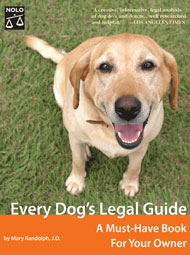Strategies for Taking Care of Pets
Animals have these advantages over man: they have no theologians to instruct them, their funerals cost them nothing, and no one starts lawsuits over their wills.
- VOLTAIRE
Although you can't leave money directly to your dog, there are lots of things you can do to make sure it is well provided for when you can no longer take care of it.
Choose a New Owner for Your Dog
When you sit down to think about what you want done with your earthly possessions after your death, make specific plans for what you want to happen to your dog. Remember, legally your dog is an item of property, and when you die, it will have a new owner. Choosing that new owner is the most important thing you can do to make sure your pet is well taken care of after your death.
Make your decision legally binding by including it in your will. Simply include a provision like this one: "I leave my dog Taffy to my friend Lola Marquez." (Variations on this simple clause are outlined below.)
If you decide to use a revocable living trust (a document that serves the same purpose as a will, but avoids probate after your death) to transfer ownership of your property at your death, you can include a similar clause in the document that creates the trust.
Whatever method you use, don't make the gift of your dog a surprise. Talk to the people you want to take the dog, and make sure they are really willing and able to do it. They may adore your dog, but if their children are allergic to it or they live in a high-rise building, they simply may not be in a position to take it.
Because circumstances change - your first choice for someone to take your dog could take a job that requires lots of travel or move into a small apartment - it's always a good idea to line up a second choice. You should name this person as an alternate beneficiary in your will or trust, too.
If you don't name a new owner in your will or trust, one of two generally undesirable consequences will result:
- Your dog will go to the residuary beneficiary of your will (the beneficiary who inherits everything that's not taken care of by the rest of the will); or
- If you don't have a will, the dog will go to your next of kin, as determined by state law.
This means that, absent a lucky coincidence, the person who will legally inherit your dog probably won't be the person you would choose.
 Nolo's Simple Will Book, by Denis Clifford (Nolo), contains explanations, forms, and instructions for writing a legally valid will customized to your needs.
Nolo's Simple Will Book, by Denis Clifford (Nolo), contains explanations, forms, and instructions for writing a legally valid will customized to your needs.
Quicken WillMaker Plus (Nolo) is software that lets you write your own valid will and living trust on your personal computer.
Plan Your Estate, by Denis Clifford and Cora Jordan (Nolo), provides in-depth information on wills, trusts, taxes, and charitable giving.

FINDING A LOVING HOME FOR YOUR DOG
It's often tough to find someone both willing and able to take care of a dog.
Responding to that need, a few programs have sprung up across the country to help people be assured that their pets will have a loving home when they can no longer care for them.
After the San Francisco SPCA fought, successfully, to save a dog that was to be put to death after the death of its owner, the SPCA began a special service (called the Sido Service, after the dog that was saved) to find loving homes for the pets of deceased San Francisco SPCA members. The new owners are also entitled to free lifetime veterinary care for the pets at the SPCA's hospital.
For more information, contact the San Francisco SPCA, 415-554-3000, www.sfspca.org.
Some other organizations take a different tack. They themselves will care for your pet for its lifetime, provided you make a large (commonly, around $10,000 to $25,000) payment or gift.
Here are a few of these programs:
Bide-A-Wee, Golden Years Retirement Home, Westhampton, NY 11977, 631-288-0591, www.bideawee.org/retirement.asp.
Purdue University School of Veterinary Medicine, Peace of Mind program, West Lafayette, IN 47907, 765-494-7607, www.vet.purdue.edu.
Kansas State University College of Veterinary Medicine, Perpetual Pet Care Program, Manhattan, KS 66506, 785-532-4013, www.vet.ksu.edu.
Stevenson Companion Animal Life-Care Center, College of Veterinary Medicine, Texas A&M University, College Station, TX 77843, 409-845-5051, www.cvm.tamu.edu.
Leave Money to the New Owner
It's a big responsibility to take care of a dog. So when you name a new owner for your dog in your will, consider also leaving that person some money, to go toward the costs of caring for the dog. It's usually a good idea, even if you think the new owner can easily afford to pay for the dog's upkeep. A dog who arrives with a full dinner dish is likely to be more welcome than one who is on the dole.
Here's a sample will clause that leaves both dog and money:
"If my dog, Taffy, is alive at my death, I leave her and $3,000 to be used for her care to Brian Smith. If Brian is unable to care for Taffy, I leave her and the $3,000 to be used for her care to Susan McDermott."
You should know that although the provision leaving the $3,000 to Brian is legal and enforceable, the part about using the money to take care of Taffy probably isn't. Your friend Brian could lose the whole stash in junk bond investments, and there wouldn't be a thing anybody could do about it. But this shouldn't be a big worry. You should leave your dog, and money to care for it, to someone you trust.
If Taffy isn't alive when you die, Brian won't get the $3,000. That money, along with any other property that the will doesn't specifically give away, will go to the person named in the will to receive the "residuary" of your estate.
HELPING OTHER ANIMALS
When you make your will or trust, remember that humane societies, rescue groups, assistance dog training centers, and other nonprofit organizations depend on donations. A gift in your will can help many animals. If you need help on wording your gift or have other questions, the organization will be more than happy to help you.
Putting conditions on the gift. It is possible, but complicated and usually impractical, to make the gift of the dog conditional on certain acts of the new owner. For example, you could put a clause like this in your will:
"If my dog, Taffy, is alive at my death, I leave her and $3,000 to Brian Smith, on the condition that Brian care for Taffy until her death, but no more than 21 years. Should Brian stop providing necessary care for Taffy, Taffy and the $3,000 shall go to the McDonough County, Wyoming Society for the Prevention of Cruelty to Animals."4
Who will enforce the condition? The executor of your estate (the person you name in the will to carry out your wishes) has the responsibility as long as the estate is still before the probate court. In most states, it takes about six months to a year to get probate wrapped up and all the property distributed. After that, it's up to the alternate beneficiary - in this example, the McDonough County SPCA. Either way, it's a lot of trouble, and conditional bequests are usually a bad idea. Once again the central truth appears: don't rely on legal niceties to protect your pets. Arrange for them to be taken care of by people who know that a dog is more than another piece of property.
Leave the Dog to One Person, Money to Another
In unusual circumstances, you may want to consider leaving a dog to one person and money for the dog's care to someone else. It may be important to consider a plan like this if the person who will care for your dog receives some kind of public assistance - Social Security disability (SSI), for example. If that person receives several thousand dollars from you in a lump sum, it might mean the grant would be cut off until the money is spent - a situation that, obviously, benefits neither your friend nor your dog.
Or perhaps you don't quite trust the dog's new owner to use the money in the way you have in mind. Let's say, for example, that your friend Brian is great with dogs and has a place in the country, but his love of animals extends to the ponies - that is, he can't stay away from the track when he's got some extra cash in his pocket. You could leave your dog to Brian and $3,000 to Brian's sister Karen, with instructions to give it to Brian in chunks that he won't find quite so tempting.
Here are some sample clauses:
"I leave my dog, Taffy, if she is alive at my death, to Brian Smith."
"If my dog Taffy is alive at my death, I leave $3,000 for her care to Karen Smith. I desire that she give her brother, Brian Smith, as long as he has custody of Taffy, $30 a month for Taffy's care. I also desire that, in addition, she use the money to pay Taffy's veterinary bills or reimburse Brian for veterinary bills he pays."
Again, remember that legally, the $3,000 goes to Karen outright if Taffy is alive when you die. The instructions about how to use it aren't legally enforceable - but they make your wishes clear, which should be enough if you choose the right people.
Set Up a Pet Trust
With a pet trust, you can leave property for the benefit of your dog. You put someone else, called a trustee, in charge of managing and spending it. The trustee follows a written set of instructions that you provide.
Sounds like just the ticket for making sure your dog has enough rawhide chews for life, but until recently, most states didn't allow trusts for animals. Now, more than half the states (listed below) allow you to create trusts for pets, with no human beneficiary. Several let you appoint someone, in the document that creates the trust, to make sure that the trustee carries out your wishes.5
One advantage of a trust is that it can take effect before your death, if you were to become incapacitated and unable to care for your dog. The provisions in a will, of course, don't have any legal effect until your death.
STATES THAT ALLOW TRUSTS FOR PETS
| Alaska | Iowa | New Mexico |
| Arizona | Kansas | New York |
| Arkansas | Maine | North Carolina |
| California | Michigan | Oregon |
| Colorado | Missouri | Tennessee |
| District of Columbia | Montana | Texas |
| Florida | Nebraska | Utah |
| Hawaii | Nevada | Washington |
| Idaho | New Hampshire | Wisconsin |
| Illinois | New Jersey | Wyoming |
Especially if family members challenge the trust, a court is likely to scrutinize, and perhaps meddle with, both the amount of money left for the animal and how long the trust is to last.6 If the amount left in trust is extravagant in the court's opinion, the court may step in to reduce it. An example is the trust set up by a Pennsylvania woman in 1974, which made $40,000 to $50,000 a year available for the care of four horses and six dogs. The court ruled that as long as the animals were well taken care of, the trustee was free to give the surplus money to the alternate beneficiaries named in the will.7
If you try to create a pet trust in a state where such trusts are not valid, it's hard to know what will happen. Courts have sometimes shown both sensitivity and creativity when faced with legally lacking trusts that well-meaning owners had created for their pets. For example, a court might deem the trust an "honorary trust," making it a valid trust, but one that wouldn't be enforced by the court.
MORE IDEAS FOR YOUR WILL
If you want to look at more sample will clauses and suggestions, order a copy of Providing for Your Pets, a pamphlet published by the Association of the Bar of the City of New York. It's available from the association's Office of Communications, 42 West 44th St., New York, NY 10036-6690, 212-382-6695 or at www.abcny.org (look under "Publications").
Keep Your Will or Trust Up to Date
What if your dog dies before you do, but your will still leaves someone money for the dog's care? If the beneficiaries fight about it in court, the money you intended to be used for the dog's care will probably still go to the person you named. For example, look at the following will clause, which was the subject of a lawsuit:
"FOURTH: Should my husband predecease me, or should we die as the result of a common disaster, I hereby give $5,000.00 to IRENE MORRISON, should she survive me, for the proper care of my dog Dutchess."
Dutchess died before her owner did, but a Colorado court ruled that Morrison should get the $5,000 anyway.8 Other courts faced with similar situations have ruled the same way.9 The theory is that the obligation to care for the dog doesn't arise until after the gift of the money is made. And because it's not the beneficiary's fault that she can't carry out the condition, she's entitled to keep the gift.
If you want to prevent a similar result, it's quite easy. When you write your will, all you need to do is word the clause so that the money is given only if your dog is still alive. Here's a clause written so that the beneficiary gets the money only if the dog is still living at the time of your death:
"If my dog Taffy is living at my death, I leave her and $3,000 to be used for her care to Brian Smith. If Brian is unable to care for Taffy, I leave her and the $3,000 to be used for her care to Susan McDermott."
